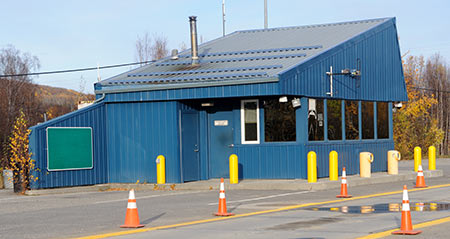If you are planning to use a rental truck for your move, you may have many questions running in the mind like - do rental trucks have to stop at weigh stations? If the answer is "Yes", then what type of vehicles have to stop at weigh stations? What's the state-by-state weigh station requirements? And how to deal with these rules?

Below is a summary of weigh station regulations for rental moving trucks. Let's have a look!
What are weigh stations?
Weigh stations are highway checkpoints used to inspect vehicular weights to ensure they meet the specific state's requirement.
Do I need to stop at weigh station with my rental truck?
Well, the answer can often be unclear. It's because some states demand all the commercial truck rentals to stop at every weigh station and others do not. However, the answer will depend on the weight of the vehicle and the various laws in that state.
What vehicles have to stop at weigh stations?
Normally, rental trucks transporting the driver's own household goods are not required to stop at weight stations. However, if your truck is over a certain weight (more than 10,000 lbs), it is better to stop so you can avoid being pulled over later and given a costly ticket.
The following are the vehicles that should stop at weigh stations:
- Agricultural vehicles - some states have agricultural inspections at the state border to prevent entering unsafe goods.
- All the trucks and trailers with Gross vehicle weight (GVW) over 10,000 lbs. must stop at the weigh stations.
- Passenger cars and pickup trucks under 14,000 lbs. are required to stop.
What's the state-by-state weigh station requirements?
Each state has its own laws determining what vehicles have to stop at weigh stations. Some states require all commercial trucks to stop, but others only require trucks exceeding a certain weight. While rental trucks are considered commercial vehicles, they are carrying personal goods and are often below the state-required weight limits. This is why it is unclear whether or not you are expected to stop at a weigh station with your rental truck.
Below are the states which requires rental trucks to stop at weigh stations. Let's have a look:
- Alaska: No
- California - Yes
- Florida - Yes, those who are carrying agricultural products or stopping at agricultural inspection station.
- Georgia - if the vehicle weighs over 10,000 lbs.
- Indiana - Yes
- Arizona - No
- Delaware - No
- New York: Over 10,000 lbs.
- Washington - No
- South Carolina - Yes
- Wisconsin - Only if the truck exceeds 10,000 lbs.
To find out more about the specific laws regarding weigh stations in the states you will be passing through, visit the state's Department of Transportation website.
What happens at weigh stations?
Usually, they will monitor the weight of your truck and collect taxes based on the gross vehicle weight to ensure that it meets the state's safety guidelines.
What does GVWR mean?
Gross Vehicle Weight Rate (GVWR) or Gross Vehicle Weight (GVW) is the total weight that is allowed for your vehicle (which means the maximum capacity of your vehicle).
What is gross vehicle weight (GVW) of a moving truck?
Rental trucks are considered commercial vehicles and are DOT-registered. Your rental truck should have its Gross Vehicle Weight (GVW) printed on the side door. If not, you will want to verify this information with your rental agency. It may also be included in your paperwork or rental guide.
The common GVW for rental trucks are:
- 14-foot has GVW of 14,050 pounds
- 17-foot has GVW of 14,050 pounds
- 24-foot has GVW of 18,000 pounds
- 26-foot has GVW of 20,000 pounds
How do weigh station works?
- A weigh station is equipped with truck scale to determine the weight of your vehicle.
- The majority are rolling scales which are built into the road in front of the Scale Officer's booth, but some older scales will require you to stop to be weighed.
- You will proceed to drive slowly across the scale, remaining under the posted speed limit.
- A display on the booth will declare your weight as you drive over the scale. Unless the Scale Officer or the signal light request that you stop and pull over for further inspection, you can continue on your way.
What happens if a truck doesn't stop at weigh stations?
If your truck doesn't stop at weigh stations, you can expect a ticket for not stopping the vehicle from the officer. However, if you are not required to stop at the weigh station, there will be no penalty for doing so. Personnel will simply wave you through.
And also, while traveling, there will be signs notifying you of the distance to the next weigh station. The signs will also indicate the weight your truck must exceed to be required to stop.
For example, the sign may read, "All vehicles with GVW of 26,001 lbs. must enter". This means all trucks over 26,000 pounds are required to stop and weigh in. Some signs may also simply read "All Commercial Trucks" without posting a weight.